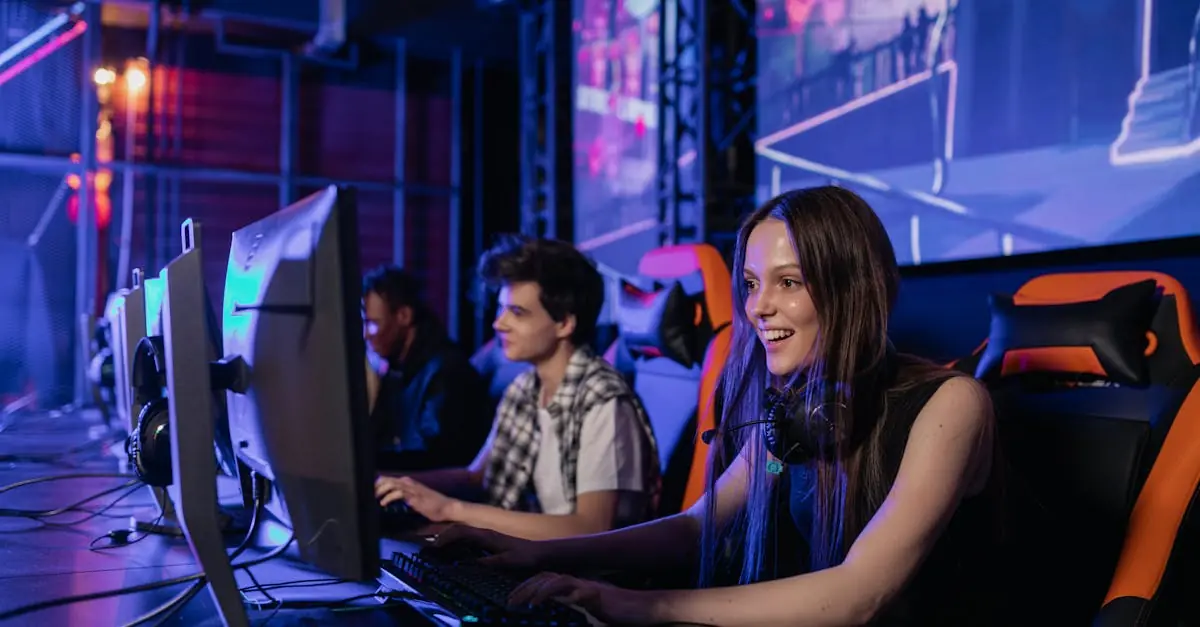In the epic showdown of gaming laptop versus PC, gamers often find themselves at a crossroads. On one side, the sleek portability of a gaming laptop promises freedom to game anywhere, even in bed (no judgment here). On the other, the raw power of a desktop PC stands ready to unleash an experience that could make even the most dedicated couch potato reconsider their life choices.
Table of Contents
ToggleOverview of Gaming Laptop Vs PC
Gaming laptops offer flexibility, enabling gamers to play on the go. Features like compact design and built-in batteries enhance their appeal, making them ideal for travel. Several high-performance models exist, tailored for various budgets and gaming needs.
Desktop PCs showcase superior performance and upgradeability. These systems accommodate larger hardware components, delivering better cooling and graphics capabilities. Gamers often prefer desktops for their power, as they typically support higher frame rates and resolutions.
Portability stands out as a significant advantage of gaming laptops. Users can easily transport these devices to tournaments or casual meet-ups. In contrast, desktops require stationary setups, limiting movement and convenience.
Battery life plays a crucial role in mobile gaming. Many gaming laptops provide several hours of usage without plugging in, while desktop PCs rely solely on direct power sources. Long-lasting batteries allow for uninterrupted gaming sessions, even away from outlets.
Cost differences between laptops and desktops need consideration. Gaming laptops typically come at a premium due to their compact nature and integrated components. Desktops often present more affordable alternatives, particularly when customized or built from individual parts.
In terms of software, both options run identical games and platforms, ensuring compatibility. Factors like the intended usage and gameplay preferences dictate the choice between a gaming laptop and a desktop PC. Each option carries distinct pros and cons tailored to diverse gaming styles and requirements.
Performance Comparison
Performance is crucial when deciding between gaming laptops and desktop PCs. Each option presents unique strengths in processing and graphics capabilities.
Processing Power
Processing power varies significantly between gaming laptops and desktop PCs. Desktop PCs often house high-performance CPUs that enhance multitasking and complex computations. They support larger cooling systems, allowing CPUs to maintain optimal performance during intense gaming. Gaming laptops, while powerful, are usually equipped with mobile processors, limiting their heat dissipation. Consequently, laptops throttle performance under heavy loads, impacting gameplay. Gamers seeking raw processing capabilities may favor desktops for upgrades and custom configurations. High-end desktop models can accommodate the latest processors, ensuring exceptional performance in demanding titles.
Graphics Capability
Graphics capability plays a vital role in the gaming experience. Desktop PCs generally use dedicated graphics cards that outperform those found in laptops. These cards boast superior memory and processing power, delivering higher frame rates and better visual details. While gaming laptops offer powerful GPUs, space constraints necessitate compromises in performance for thermal management. Gamers wanting the best visual experience often choose desktops, as they can upgrade to cutting-edge graphics cards. Additionally, desktop setups allow for multiple graphics cards, enhancing rendering capabilities for immersive gameplay. By comparing graphics options, it’s clear that desktop PCs typically provide superior performance in demanding scenarios.
Portability and Design
Portability and design play vital roles in comparing gaming laptops and desktop PCs. Gamers often consider weight and size, alongside build quality, when choosing their ideal setup.
Weight and Size
Weight and size greatly impact the portability of gaming laptops. Typically, these devices weigh between 4 to 6 pounds, making them easy to carry to gaming events. In contrast, desktop PCs usually consist of heavy components, with towers weighing 20 pounds or more. This increased weight limits their mobility and requires a dedicated space. Laptops come in various sizes, with screens ranging from 15 to 17 inches. A sleek design enhances the appeal of many gaming laptops, allowing them to fit into backpacks readily. Players appreciating convenience often favor laptops, as larger desktops necessitate extensive setups and physical space.
Build Quality
Build quality significantly influences durability and user experience. Gaming laptops exhibit robust construction to withstand frequent transport, with metal and high-quality plastics enhancing longevity. Models often incorporate reinforced hinges and sturdy keyboards, ensuring resilience against daily wear. Desktop PCs, on the other hand, offer customizations that cater to specific preferences, including case designs that enhance airflow and aesthetics. High-performance desktops often utilize larger, premium components, promoting better cooling systems. The choice between a laptop and desktop can come down to personal preferences regarding build quality since both genres display a commitment to performance and durability tailored to distinct gaming needs.
Upgradability and Customization
Upgradability and customization remain crucial factors in choosing between gaming laptops and PCs.
Gaming Laptops
Gaming laptops offer limited upgrade options. Typically, users can upgrade RAM and storage but may face restrictions with other components. Compact designs do not easily accommodate larger parts, restricting flexibility. Performance enhancements are often constrained by thermal limitations and power supply. A few models incorporate user-replaceable parts, yet the majority focus on maximizing portability. It’s important to consider the long-term viability as gaming requirements evolve.
Gaming PCs
Gaming PCs excel in upgradability and customization. They allow users to swap out CPUs, GPUs, and motherboards, accommodating high-performance components. Owners can tailor their systems according to specific gaming needs. Cooling solutions can also be enhanced, supporting better airflow and thermal management. Custom builds enable gamers to prioritize performance or aesthetics based on preferences. The modular nature of desktop PCs ensures longevity and adaptability over time, making them a favorable choice for avid gamers.
Price Considerations
Cost plays a vital role in the gaming laptop versus desktop PC debate, influencing gamer choices significantly.
Initial Costs
Gaming laptops generally feature higher initial price tags compared to desktop PCs. They often range from $800 to over $2,500, depending on specifications and brand. In contrast, desktop PCs usually start around $500 for entry-level systems, making them more budget-friendly options. Performance often dictates these prices; gaming laptops pack powerful hardware into compact forms, which contributes to their cost. Custom-built desktop PCs, on the other hand, can be tailored to fit various budgets, allowing users to select components based on their needs and financial limits.
Long-Term Investment
In terms of long-term investment, desktop PCs frequently offer better value. They allow users to upgrade components over time, extending usability and performance longevity. Gamers can easily swap out GPUs, CPUs, or storage, adapting to new game requirements as they emerge. Gaming laptops lack this flexibility, often requiring entire system replacements to keep up with advancements. Higher-grade laptops may also face faster depreciation due to their compact design. Considering maintenance and upgrade potential, desktops generally prove more economical in the long run, appealing to serious gamers aiming for sustained performance.
Choosing between a gaming laptop and a desktop PC ultimately boils down to individual preferences and gaming needs. For those who value portability and convenience a gaming laptop is an excellent choice. It allows gamers to enjoy their favorite titles anywhere without being tethered to a desk.
On the other hand gamers who prioritize performance and upgradability will find desktop PCs more appealing. With superior power and the ability to customize components they can deliver an enhanced gaming experience.
Both options have their unique advantages and drawbacks. Understanding these factors will help gamers make an informed decision that aligns with their lifestyle and gaming aspirations.




